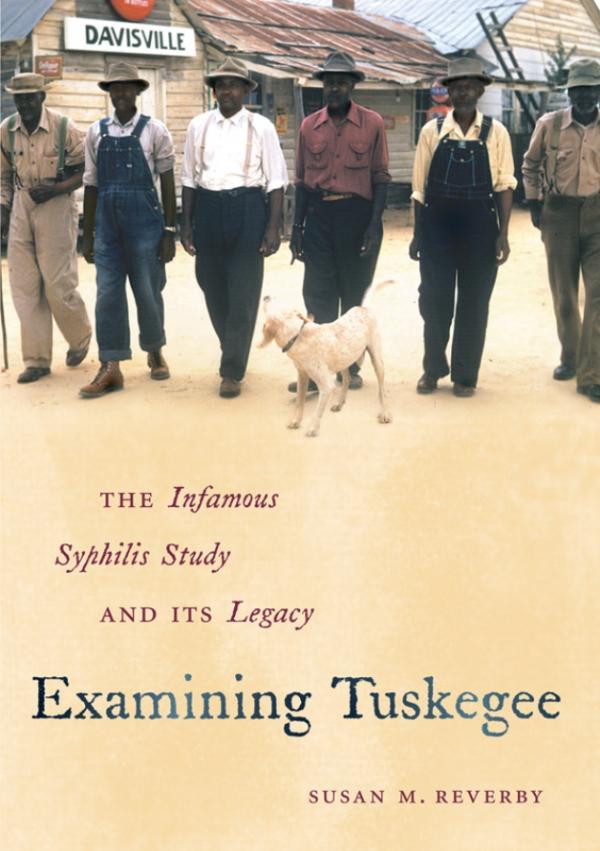The Painful Legacy of Human Experimentation
Research funded by a 1995 NEH grant to Wellesley College’s Susan Reverby became the basis for long-term scholarly engagement with the notorious “Tuskegee” Syphilis Study, and lead to the discovery of a disturbing chapter in the history of human experimentation in Guatemala.

Susan M. Reverby's Examining Tuskegee (UNC Press 2009) has won multiple awards, including the 2011 James F. Sulzby Award from the Alabama Historical Association, and the 2010 Arthur J. Viseltear Award from the American Public Health Association.
Credit: Copyright © 2011 by the University of North Carolina Press.

Susan M. Reverby's Examining Tuskegee (UNC Press 2009) has won multiple awards, including the 2011 James F. Sulzby Award from the Alabama Historical Association, and the 2010 Arthur J. Viseltear Award from the American Public Health Association.
Credit: Copyright © 2011 by the University of North Carolina Press.
Before 2010, Susan Reverby was perhaps best known for her work investigating the notorious 40-year study of “untreated syphilis in the male Negro,” during which members of the U.S. Public Health Service (PHS) observed (but did not attempt to treat) the effects of late-stage syphilis in over 400 African American men living around the town of Tuskegee in Macon County, Georgia. Reverby’s research into those experiments, commonly known as the “Tuskegee” study, has already spawned two widely acclaimed books: Tuskegee’s Truths (ed. 2000, UNC Press) and Examining Tuskegee (2009, UNC Press).
And it was while combing through the archives of one of the study’s chief practitioners, Dr. John Cutler of the PHS, that Reverby, an historian of American women, medicine, and nursing at Wellesley College, discovered evidence of a disturbing offshoot of PHS syphilis experimentation, this time in Guatemala. The experiments, conducted from 1946 to 1948 on men and women in Guatemalan army barracks, prisons, and asylums, involved more extreme practices than those associated with the Tuskegee study, including deliberate, painful methods for infecting subjects with syphilis. (Despite popular claims to the contrary, “Tuskegee study” scientists did not - and as Reverby argues, likely could not – surreptitiously infect their American subjects with the sexually transmitted disease.)
Alarmed by the shocking nature of her discovery, Reverby alerted contacts at the U.S. Centers for Disease Control, where the late David Sencer, then the director of the CDC, took her findings seriously and quickly commissioned a CDC study of the same archival material that confirmed her research. Reverby’s report on the syphilis experiments in Guatemala, which appeared in the Journal of Policy History in January 2011, includes an addendum about the serious investigative measures taken by the U.S. in the wake of her discovery. On September 16, 2011, the President’s Commission for the Study of Bioethical Issues published a 220-page report on the history and implications of the PHS experiments, and the Commission has used the case as a starting point for further conversation about the ethics of human medical experimentation.
******
Considering the major influence her research has had, it is difficult to believe that Reverby’s initial proposal to publish her work fell flat. Reverby had intended that the research she conducted in the 1990s on the Tuskegee study, funded in part by a $30,000 NEH grant, would form the heart of a book project on nurse Eunice Rivers Laurie, a controversial figure in the history of the Tuskegee syphilis experiments. Questions surrounding the role of Rivers, a nurse who worked with PHS doctors and administrators over the entire 40-year course of the study, have long fascinated the scholars and the public. But at a fateful meeting in a coffee shop New York City, a disappointed Reverby listened as a literary agent told her that her proposal could not sustain a book-length treatment. “It was a terrible moment,” Reverby said.
Reverby soon found a home for her research on Nurse Rivers in a volume she edited that brought together archival documents and scholarly articles dealing with multiple aspects of the history and reception of the Tuskegee study (Tuskegee’s Truths, ed. 2000). In 2009, she published Examining Tuskegee, a penetrating look into the historical circumstances of the study, and a sober exploration of the complicated public legacy of “Tuskegee” in America. The book earned widespread praise and won multiple awards, including the 2011 James F. Sulzby Award from the Alabama Historical Association, the 2010 Arthur J. Viseltear Award from the American Public Health Association, and the 2010 Ralph Waldo Emerson Award of the Phi Beta Kappa Society.
Reverby plans to explore further the ways that the stories of public health scandals are told in a future monograph, provisionally titled “Escaping Melodrama.” This latest addition to her long-term and influential research into the history of human experimentation is further proof that a modest investment by the NEH can pay dividends for years to come. Reflecting on the long path of her research on the Tuskegee study and its aftermath, Reverby expressed gratitude for the role that her NEH grant played: “At a small liberal arts college, the workload and emphasis on teaching and service can be so intense, so it’s very important to find funding to make research sabbaticals viable.”
